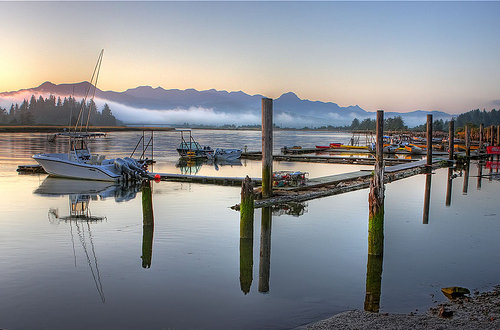Wheeler Docks and Neahkahnie Mountain – Courtesy City of Wheeler
Wheeler is a tiny town of about 400 residents, which borders the Nehalem River estuary in Tillamook County. It is a picturesque place, and that is one of its great assets. But Wheeler’s waterfront happens to have a fairly large, undeveloped parcel, owned until 2016 by Tillamook County residents Vern Scovell and John Jelineo. The town is on a hill, so views from its houses, across the vacant property and into the Bay, are magnificent. Scovell and Jelineo also owned Botts Marsh, an important saltwater marsh lying next to the shore. Scovell long ago tried to build a marina there, and Tillamook County granted an exception for the project in 1985 — but it was never built. Later, the two owners tried twice for an Oregon Parks and Recreation grant to make the Marsh and much of the upland a park. Unfortunately, OPRD twice denied the grant, the second time in June 2014.
Wheeler’s residents know what their town should look like. The Wheeler Vision Report, completed in 2011, makes it clear that residents want several things: a Planned Development Ordinance that protects the small town atmosphere; a waterfront plan that emphasizes low key buildings, natural resources protection and limits on large-scale development; and a focus on green space that enhances the City. Whether or not these things happen depends on the town’s political will. In November 2012, City Council directed that the Vision Report be made a part of the Comprehensive Plan as an essential background document. This was a very positive step.
The Fight for Wheeler’s Future: The Ulbricht Project
In 2016 the entire property, both Botts Marsh and the upland, were sold to Ken Ulbricht, a developer from Seaside. Ulbricht eventually sold the Marsh to the Lower Nehalem Community Trust, and it is protected. But after a long anticipated wait, Ulbricht in 2019 unveiled his plans for the upland property, to residents’ dismay: he proposed a large “boutique” hotel and a commercial building for fish processing that would also contain a restaurant, employee housing and other uses. It was called “The Village on Nehalem Bay.” Cottages were to be added later, in a subsequent phase of the development.
The project was controversial from the outset, at the initial planning commission hearings. The issues included traffic, water and sewer availability, the property’s geological stability, and soil contamination from previous use as a millsite. But the central issue was whether such a massive project aligned with the Vision Plan, which is a mandatory criterion for development approval. Residents, and Oregon Coast Alliance, were adamant that it did not. Nevertheless, the planning commission, and then City Council, approved the project in 2020. ORCA and concerned residents appealed the approval to the Land Use Board of Appeals.
LUBA remanded the city’s decision, principally on grounds that the city had failed to show how the project aligned with the Vision Plan. At a remand hearing in May 2021, Ulbricht tried again to show how his Village on Nehalem Bay fit the tenets of Wheeler residents’ vision for their future. But this time City Council disagreed, and voted against reinstating the project. Wheeler residents have good cause to be proud of their defense of a future for their town, which they laid out a decade before the Ulbricht project tested the strength of their vision. Wheeler, and the Nehalem Bay waterfront, will remain as picturesque as they always have been.
DOCUMENTS:

